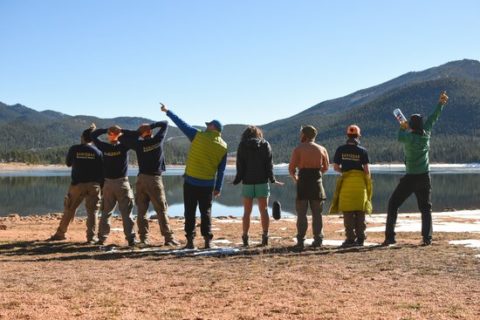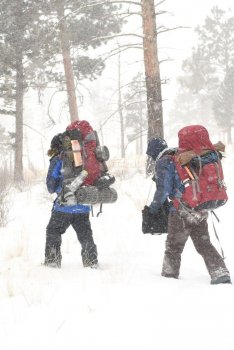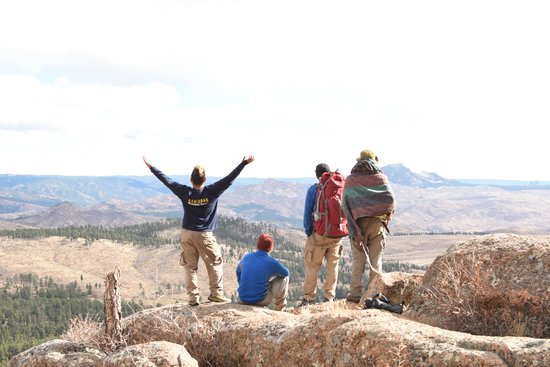07
Aug 2019
Engaging Agency, Engendering Growth
February 27th, 12:18am, from the journal of a BaMidbar Field Guide:
“Why on earth do I choose to do this? People have normal jobs. I could be working a 9-5 office job someplace and be home in the comfort of my bed right now. When things get rough, when students take three hours to pack up after setting a 30-minute goal, and all of a sudden it’s 11pm and we are still pushing through to find the campsite, when I feel I’m at the end of my line, and it feels like things could not possibly get any harder… I guess that’s how I know this is all worth it. Growth. Where else could I get more of it? Certainly not from staying in my comfort zone. Comfort zone, stretch zone and panic zone. If all three exist in my workspace, I’d say that’s a pretty good indicator it’s a good place to be.”
Working as a Field Guide at BaMidbar Wilderness Therapy is tough. Field Guides are in the wilderness for days or weeks on end, away from family and loved ones, technology and the creature comforts of modern life. They handle unpredictability, are exposed to a variety of weather and elemental forces and work with students experiencing deep internal struggle. Field Guides cannot merely be transmitters of program philosophy or facilitators of program structure; they must bring their whole and authentic self to the work. Working in a residential, mental health treatment environment, their primary job is to engage each student’s individual agency: to help the student grow internally and from their own motives.
How do you teach someone to engage agency, to engender someone else’s growth and development? It takes a high level of emotional intelligence to effectively engage agency, particularly from an at-risk population. Luckily, emotional intelligence is not just a quality, it’s also a skill, a muscle that can be developed, stretched and strengthened. At BaMidbar, we focus on eight areas to support staff in strengthening their emotional intelligence muscles. The descriptions below of these eight areas are adapted from BaMidbar’s Field Guide Manual.

Accept Yourself
I frequently tell staff, ‘you can only take someone as far as you’ve gone yourself.’ A guide’s greatest power lies in their personal understanding of their own process of becoming the person they are today and their ability to actively share that process. BaMidbar asks guides to accept and capitalize on who they already are and the unique gifts they alone have to give.
Cultivate Humility
Anavah, humility, is understood as taking up the right amount of space. This means you do not think you are more than or less than what you really are. By taking up the right amount of space ‐ being neither arrogant or unworthy ‐ the person with humility welcomes the opportunity to learn from others. The humble person understands that every person encountered has something to teach.
Be Willing to Let Go
If you’ve been hired as a BaMidbar Field Guide, you likely have a lot of experience and a well-developed personal philosophy. To be a truly effective Field Guide though, one must also learn to unlearn. Each of us carries images of ourselves and assumptions about the world that impact how we move through life and interact with others. While these beliefs may be personal truths, they might not be universal truths. What serves a staff member might not serve a student and their unique needs. Only as we let go can we then grasp something else, see others clearly, learn new things and allow each individual to find their own unique path.
Do Your Own Work
Each staff should be walking the same road we expect our students to walk, seeking to change and grow. If we think our own highest degree of personal effectiveness as a Field Guide is achievable by living one way in the midbar ‐ the wilderness ‐ and another way out of the midbar, we are mistaken. We cannot effectively help a student forgive if we are holding serious hurts and grudges. We cannot effectively help a student find their path to sobriety if we binge on our off week. Students need Field Guides who are doing their own personal work.
Love Them
When working with an at-risk population, this value is of the utmost importance. Each staff must learn what this means to them personally and seek to be mindful of their capacity to love honestly and without expectation of reciprocity. People choose as true mentors and teachers those from whom they feel genuine love. A staff’s view of a particular student will determine what they are able to observe about them. When staff see a student as worthy of unconditional love, they are able to notice all aspects of their behaviors pertinent to their treatment and healing.
 Remain Unoffended
Remain Unoffended
When offended, we fixate on our own needs and challenges, not the motives and challenges of the student. All behavior is communication and negative behavior is oftentimes communication of an unmet need. A Field Guide’s job is not to manipulate behavior; rather, it is to support a student in effectively communicating and meeting their needs. When staff remain unoffended, they are better able to see the students for who they are (not what they do), and therefore are better able to understand the help they need from program staff, their therapist and the group.
Create Fun
Full-blown, run-around, heart-pounding, all‐in fun and games is an essential part of the Field Guide role. Play relieves anxiety. Playing a game with students gives staff a different context for observation and assessment. Playing a game helps the students see staff and other students as people like them. Playing gives opportunity for interventions that may not come up otherwise. Playing gives students opportunities to enjoy time with staff. This helps foster a relationship of trust and invites students to be more open and honest with staff.
Interject Meaningfully
Observe Carefully
In order to interject themselves meaningfully into the lives of students, staff have to know what kind of interjections are needed. This takes careful observation. Staff should observe students’ interactions, scan for subtle behaviors and look for signs that help staff understand how the student sees the world and themselves. Seek to understand before interjecting.
Get into Their Space
Students need to be interrupted in many ways, all the time. They need to be interrupted in their behavior, thoughts, self‐image, patterns, self‐justifications, etc. Field Guides are not doing their job if they are not interjecting themselves into the very lives of students several times a day. Sometimes an interjection might be playing a quick game, other times it might be pulling a student aside, and still other times it might be holding an impromptu group. Behavior should never “slide by.”
Focus on Way of Being
Focus on behavior that reveals the student’s way of being, like how they treat others or how they talk about themselves. Almost all behavior can and might need to be addressed, but some behaviors, albeit subtle sometimes, are more important than others in terms of helping the student notice their way of being.
Working at BaMidbar, I am constantly amazed at the maturity, intentionality and patience of Field Guides. They work while hungry, tired, wet and cold, maintaining safety under all circumstances, while keeping a smile on their face. Just as I’ve seen our students grow at BaMidbar, I’ve seen our staff go through an incredible transformation as well. They wholly embrace what it means to engage agency, interject meaningfully and bring their whole selves to the work that they do. This takes profound self-knowledge and willingness to dig deep personally, to support students in their own process of growth, development and self-discovery.

All photos courtesy of BaMidbar.
Get To Know The Author
Wexner Field Fellow Jory Hanselman (Class 3) is the founding director of BaMidbar Wilderness Therapy at Ramah in the Rockies, the nation’s first Jewish wilderness therapy program. BaMidbar guides Jewish young adults struggling with depression, anxiety, and healthy pathways from adolescence to adulthood on individualized journeys of self-discovery and healing.
Other posts by this author ›

